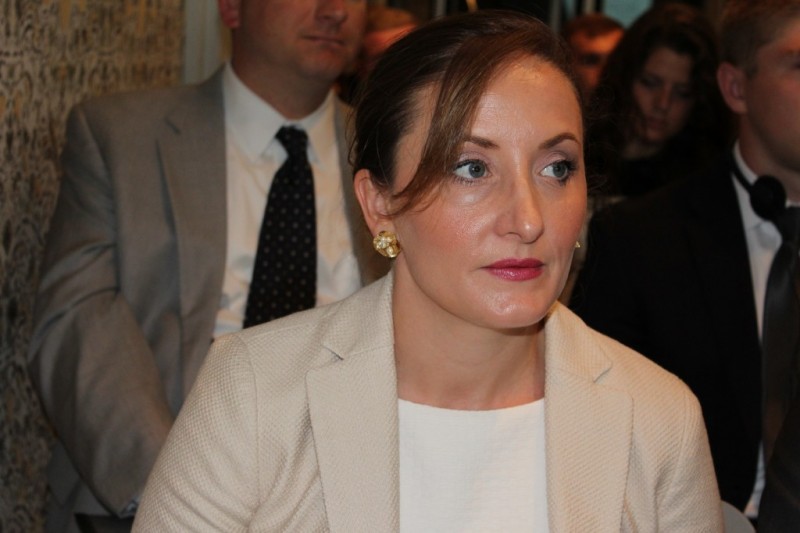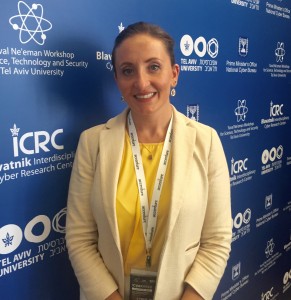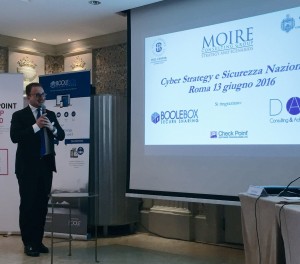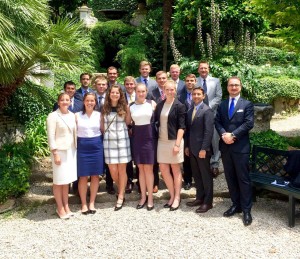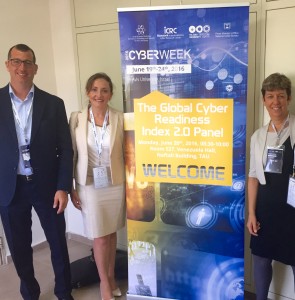Senior Fellow Engages with International Cybersecurity Community
Newport, R.I. — Pell Center Senior Fellow Francesca Spidalieri spent the month of June traveling throughout Europe and the Middle East to speak at three different international conferences on cybersecurity and to engage with world-renowned experts and policy-makers shaping the future of Internet governance and security. Spidalieri shares her account of the trip:
Capitalizing on the research carried out in the past year on cyber leadership development and countries’ cyber preparedness and resilience, I eagerly participated in multiple international engagements on cybersecurity-related topics and shared insights and lessons learned from the field.
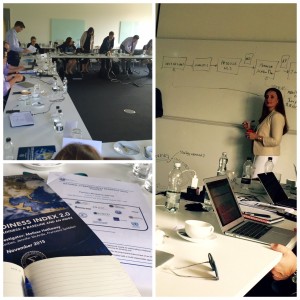 I first visited Oxford, UK for a two-day workshop with representatives of major international organizations, including the International Telecommunication Union (ITU), the United Nations Conference on Trade and Development (UNCTAD), the World Bank, the Organization for Economic Co-operation and Development (OECD), European Network and Information Security Agency (ENISA), the Commonwealth Telecommunications Organizations (CTO), the Potomac Institute for Policy Studies (PIPS), and others. These organizations are working in tandem to develop a National Cybersecurity Strategy (NCS) Reference Guide meant to help countries around the world elaborate, implement, or further enhance their respective national cybersecurity strategies. This document will be a key resource for countries to gain a clear understanding of what the purpose and content of a national cybersecurity strategy should be, and will outline relevant models—such as the Cyber Readiness Index 2.0 (CRI) I have been working on—available to governments to enhance cybersecurity and protect critical information infrastructures essential to their national security and economic well-being.
I first visited Oxford, UK for a two-day workshop with representatives of major international organizations, including the International Telecommunication Union (ITU), the United Nations Conference on Trade and Development (UNCTAD), the World Bank, the Organization for Economic Co-operation and Development (OECD), European Network and Information Security Agency (ENISA), the Commonwealth Telecommunications Organizations (CTO), the Potomac Institute for Policy Studies (PIPS), and others. These organizations are working in tandem to develop a National Cybersecurity Strategy (NCS) Reference Guide meant to help countries around the world elaborate, implement, or further enhance their respective national cybersecurity strategies. This document will be a key resource for countries to gain a clear understanding of what the purpose and content of a national cybersecurity strategy should be, and will outline relevant models—such as the Cyber Readiness Index 2.0 (CRI) I have been working on—available to governments to enhance cybersecurity and protect critical information infrastructures essential to their national security and economic well-being.
After the United Kingdom, I traveled to Rome, Italy to participate in the first-ever Conference on “Cyber Strategy and National Security,” co-sponsored by Moire Consulting and the Pell Center. The invitation-only event was attended by government representatives, diplomats, selected journalists, subject-matter experts, and a delegation of midshipmen and instructors from the US Naval Academy. This was one of the first times in which the Italian government publicly discussed some of its most ambitious efforts—including the creation of an Italian Cyber Command—to defend Italy’s critical infrastructures and sensitive information from cyber threats emanating from state and non-state actors. On this occasion, I had the privilege of representing both my native country—Italy—and my adopted country—the United States—and to help building bridges between the two. In addition, I had the opportunity to discuss one of my most recent Pell Center studies on the role that US service academies play in developing a pipeline of qualified cyber strategic military leaders, and share findings and lessons learned with Italian representatives.
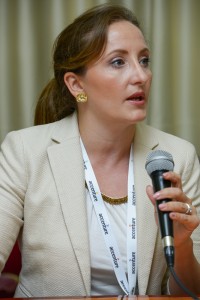 I then headed to Tel Aviv, Israel to take part in the 6th Annual International Cybersecurity Conference, also known as Cyber Week, organized by the Tel Aviv University’s Blavatnik Interdisciplinary Cyber Research Center, the Israeli National Cyber Bureau, and Israel’s Ministry of Foreign Affairs. The annual event brings together cybersecurity professionals from Israel and around the world to meet with policymakers, entrepreneurs, investors, and academics to discuss cyber threats facing the international community and the latest advances in cyber technology. This year, the program focused on the impact of cyber threats on commerce, technology, economy, academia, defense, and diplomacy, and included lectures, a start-up competition, workshops, and roundtables. On the first day of the conference, I delivered a presentation on the “Global Cyber Readiness Index,” a methodology specifically designed to evaluate countries’ maturity and commitment to securing their national cyber infrastructures and services upon which their digital future and growth depend. The panel discussion that followed provided an opportunity for policymakers, subject-matter experts, and diplomats in the audience to weigh in and engage in a lively discussion on the economic erosion caused by cyber insecurity.
I then headed to Tel Aviv, Israel to take part in the 6th Annual International Cybersecurity Conference, also known as Cyber Week, organized by the Tel Aviv University’s Blavatnik Interdisciplinary Cyber Research Center, the Israeli National Cyber Bureau, and Israel’s Ministry of Foreign Affairs. The annual event brings together cybersecurity professionals from Israel and around the world to meet with policymakers, entrepreneurs, investors, and academics to discuss cyber threats facing the international community and the latest advances in cyber technology. This year, the program focused on the impact of cyber threats on commerce, technology, economy, academia, defense, and diplomacy, and included lectures, a start-up competition, workshops, and roundtables. On the first day of the conference, I delivered a presentation on the “Global Cyber Readiness Index,” a methodology specifically designed to evaluate countries’ maturity and commitment to securing their national cyber infrastructures and services upon which their digital future and growth depend. The panel discussion that followed provided an opportunity for policymakers, subject-matter experts, and diplomats in the audience to weigh in and engage in a lively discussion on the economic erosion caused by cyber insecurity.
In short—what an incredible journey through half of the world! Even though all of these engagements show how far the international community has gone in combating cybercrime and other malicious cyber activities and in establishing international norms of conduct in cyberspace, they also continued to confirm that much still remains to be done in the years ahead.
I look forward to continuing to participate in these important discussions and use my research at the Pell Center to raise awareness about systemic problems and actionable solutions in this field. – Francesca Spidalieri, Senior Fellow for Cyber Leadership

